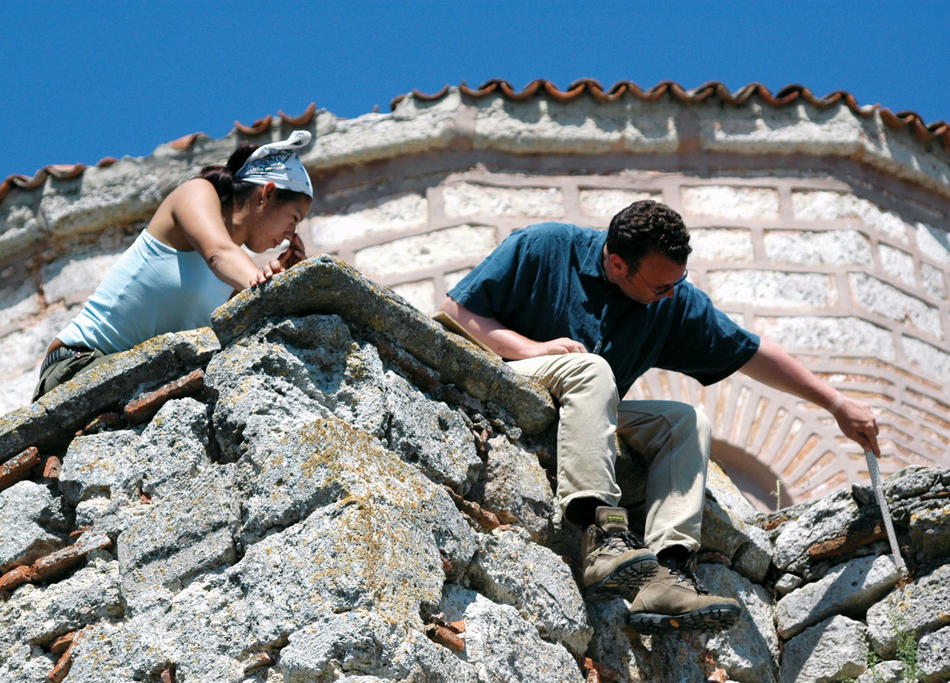Columbia, as part of an ongoing effort to expand its academic presence overseas, recently opened a Global Center in Istanbul, Turkey.
The new center, officially inaugurated with a series of events in Istanbul from November 1 to 3, joins a network of Columbia Global Centers established in Amman, Beijing, Mumbai, Paris, and Santiago over the past three years. The center’s staff will help Columbia faculty pursue new research, teaching, and service projects by putting them in touch with local collaborators; it will foster new student-exchange and fellowship opportunities; and it will host conferences, seminars, and social events open to alumni in the region.
“The goal is to promote a wide range of collaborations between faculty and students from Columbia and their Turkish counterparts,” says Ipek Cem Taha ’93SIPA, ’93BUS, a Turkish journalist and businesswoman who is serving as the center’s interim director. “We have a lot to learn from one another.”
Turkey is already the site of several research and service projects led by Columbia professors. The psychologist Jack Saul, for instance, is working with Turkish colleagues to train mental-health-care professionals to treat people traumatized by war, political violence, and domestic abuse; Elazar Barkan, an expert on conflict resolution, is working with the Istanbul-based nonprofit Anadolu Kültür to develop cultural exchanges between ethnic Turks and Armenians; and Holger Klein, an art historian, is studying Byzantine art and architecture in the Turkish city of Vize.
Karen Barkey, a Columbia sociology professor, has been appointed to lead a faculty steering committee to identify additional Columbia professors interested in launching projects in Turkey. “I’m already receiving a lot of phone calls from academics at Turkish universities with ideas for new projects,” says Barkey, who has written about religious and ethnic tolerance in the early Ottoman Empire. “I’m pairing them with Columbia faculty who would make good research partners.”
In early November, president Lee C. Bollinger, acting provost John Coatsworth, and several deans traveled to Istanbul to attend the center’s opening, where Columbia professors participated in a series of public discussions with Turkish, Egyptian, and Iranian intellectuals about pressing issues that scholars could pursue at the new center. One panel, moderated by journalism professor Sheila Coronel, considered how the Internet is providing a platform for more independent journalism while also spreading disinformation and hate speech. Another examined how recent Turkish history holds lessons for Egypt’s nascent democracy movement.
“A theme that emerged from our talks is that Turkey has already gone through a lot of the changes that protesters in Egypt and other Arab countries are now demanding,” says Barkey. “Turkey once had a military leadership that hindered its democratization. And many secularists were tempted to support the military, for fear of what could happen if Islamists took over. Yet over the past couple of decades, Turkey’s government, although influenced by Islam, has become increasingly liberal and protective of minority rights.”
Mustafa Akyol, a local political analyst and deputy editor of the Turkish Daily News, said that economic development was instrumental in liberalizing social attitudes in Turkey. “As a middle class developed here, people started to see the world through a different lens,” he said. “Many are still pious Muslims, but their Islam tends to be more globalized and open to outside influences.” Amira Howeidy, an editor of the English-language newspaper Al-Ahram Weekly, which is based in Cairo, expressed optimism that Egypt will become a tolerant democracy. “Among the younger generation, we’re already witnessing new bodies of thought, new types of liberal Islam,” she said. “What exactly will emerge, we’re not sure.”
The new Global Center occupies about 3,000 square feet in a stone-faced, 19th-century building in Istanbul’s modern center, Taksim Square. It features several offices and a large conference facility.
“Any Columbians traveling through Istanbul are welcome to stop by,” says Kenneth Prewitt, Columbia’s vice president of Global Centers. “The center is a place where you can conduct meetings, hold an academic conference, or simply gather with fellow alumni.”



